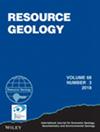Distribution of gold and silver and its relation with hypogene ore minerals in the Esperanza porphyry deposit, Antofagasta Region, Chile
IF 0.8
4区 地球科学
Q3 GEOLOGY
引用次数: 1
Abstract
Modes of occurrence of Au‐ and Ag‐bearing phases and their relation with associated hypogene ore minerals were examined with the objective to elucidate Au‐Ag distribution at the Esperanza porphyry deposit in the Eocene Centinela copper belt, using ore‐microscope modal analysis, semi‐quantitative analyses by automated mineralogy, electron probe microanalysis, and secondary ion mass spectrometer. The Esperanza hypogene mineralization is characterized by early‐stage chalcopyrite‐rich veinlets in the potassic alteration zone and later polymetallic stage with tennantite and galena in the chlorite‐sericitic alteration zone. Only the early‐stage chalcopyrite contains fine‐grained electrum (Au68Ag32 ‐ Au81Ag19) and hessite (Ag2Te), and thus yields positive correlations in Cu vs. Au and Cu vs. Ag grades that are clearly recognized in the hypogene sulfide zone. The early‐stage chalcopyrite grains frequently exhibit polysynthetic twinning suggestive of inversion from intermediate solid solution. These features suggest that the fine‐grained electrum and hessite are products exsolved in the cooling process with the intermediate solid solution to chalcopyrite inversion. In contrast, tennantite and galena of the later‐stage mineralization contain no detectable Ag, and it is thus proposed that the early‐stage inverted chalcopyrite is the principal storage of economically important precious metals.智利安托法加斯塔地区埃斯佩朗萨斑岩矿床金、银的分布及其与深部矿石矿物的关系
采用矿石显微镜模态分析、自动化矿物学半定量分析、电子探针微量分析和二次离子质谱仪等方法,研究了始新统Centinela铜带Esperanza斑岩矿床含金、含银相的赋存模式及其与伴生矿物的关系。埃斯佩朗萨凹陷成矿的特征是在钾蚀变带中形成早期富含黄铜矿的细脉,在绿泥石-绢云母蚀变带中形成晚期含天帘石和方铅矿的多金属成矿。只有早期黄铜矿中含有细晶铜(Au68Ag32‐Au81Ag19)和赤铁矿(Ag2Te),因此Cu与Au和Cu与Ag的品位呈正相关,这在下第三系硫化物带中得到了清晰的识别。早期黄铜矿晶粒常表现为多合成孪晶,表明其由中间固溶体转变而来。这些特征表明,细晶的铜和海丝石是在冷却过程中以中间固溶体向黄铜矿转化而析出的产物。与此相反,后期矿化的tenten锑矿和方铅矿则不含可检测到的银,因此我们认为早期倒立黄铜矿是具有重要经济价值的贵金属的主要储藏地。
本文章由计算机程序翻译,如有差异,请以英文原文为准。
求助全文
约1分钟内获得全文
求助全文
来源期刊

Resource Geology
地学-地质学
CiteScore
2.30
自引率
14.30%
发文量
18
审稿时长
12 months
期刊介绍:
Resource Geology is an international journal focusing on economic geology, geochemistry and environmental geology. Its purpose is to contribute to the promotion of earth sciences related to metallic and non-metallic mineral deposits mainly in Asia, Oceania and the Circum-Pacific region, although other parts of the world are also considered.
Launched in 1998 by the Society for Resource Geology, the journal is published quarterly in English, making it more accessible to the international geological community. The journal publishes high quality papers of interest to those engaged in research and exploration of mineral deposits.
 求助内容:
求助内容: 应助结果提醒方式:
应助结果提醒方式:


